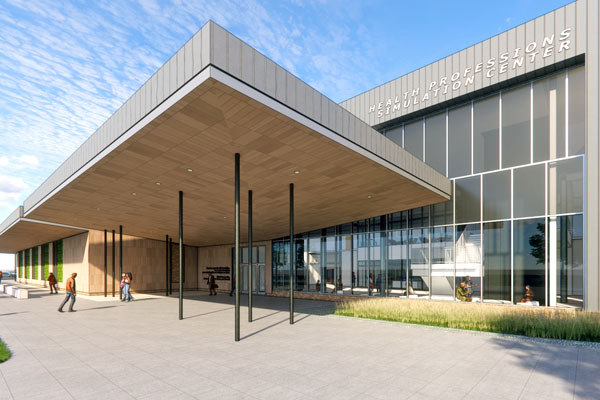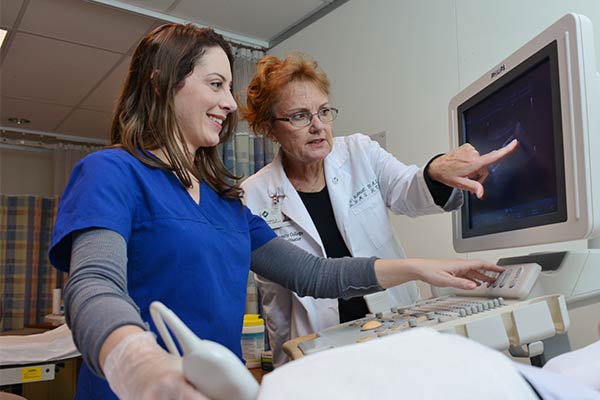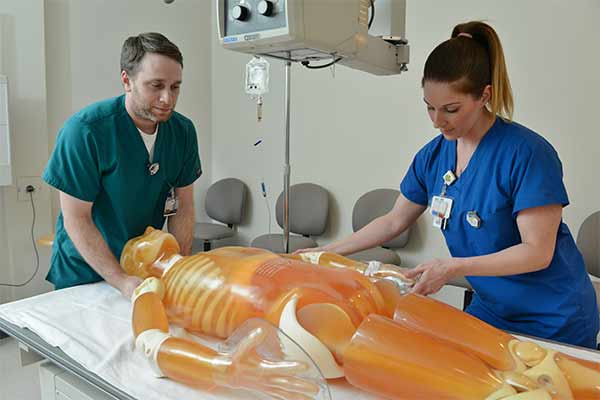New Health Sciences Building, Opening in 2027
In 2027, the health sciences programs will move to the new state-of-the-art Health
Sciences building on our Orchard Ridge Campus. Here, you will meet and work with expert
caring faculty, staff, and students in all the healthcare disciplines—just as you’ll
experience in the field.
Check out the New Facilities
A Life-Changing Career
The federal Bureau of Labor Statistics predicts that respiratory therapist employment will grow 13 percent from 2022 to
2032, much faster than the average for all occupations.
Our Respiratory Therapy Program Goals
Oakland Community College's Respiratory Therapy program is designed to equip you with
the skills and knowledge needed to excel in this dynamic field. After completion of
this program you will have:
- Knowledge: You will possess the necessary respiratory therapy knowledge. (cognitive domain
elements)
- Skills: You will be proficient in respiratory therapy skills. (elements of the psychomotor
domain)
- Attitude: You will demonstrate professional behavior and communication skills. (pertaining
to affective domain areas).
What it Takes to Excel as a Respiratory Therapist
To succeed in OCC’s RSP program you need to meet our program’s technical standards:
- Academic: Master medical terminology, analyze patient data, conduct research.
- Interpersonal: Collaborate, communicate clearly, build rapport with diverse patient populations,
classmates, and instructors.
- Clinical: Perform vital signs, phlebotomy, lab tests, make rapid decisions, apply theory to
practice.
- Physical: Ability to transport equipment and patients, perform CPR, interpret orders, observe
patients, move quickly within workspace, respond to verbal and nonverbal cues.
- Technical: Computer proficiency, documentation, adherence to HIPAA.
Five key facts about OCC’s Respiratory Therapy program
- Up to 30 students join the program each year.
- It’s a full-time program that lasts for 20 consecutive months (September through the
second April) after you complete your prerequisite classes.
- Your instructors are highly experienced practitioners with multiple credentials or
advanced degrees.
- Most students receive job offers before graduation.
- There is currently no wait list for the program.
Explore Healthcare Careers on March 12
Join us for our health sciences open house and learn how OCC can help you turn your
passion for healthcare into a rewarding career.
Register for Health Sciences Open House
Attend a Program Info Session
Your first step: Register for the most convenient upcoming session. You will learn
about:
- Program requirements
- Theory classes
- Labs
- Clinical phases
- How to succeed
All sessions held via zoom require cameras to be on.
11:30AM Virtual Event
All information sessions are approximately 90 minutes long. You must reserve a spot to attend....
5:30PM Southfield Campus - Building A
Join us on the Southfield Campus to learn about our many degrees, certifications, and...
9:00AM Virtual Event
All information sessions are approximately 90 minutes long. You must reserve a spot to attend....
9:00AM Virtual Event
All information sessions are approximately 90 minutes long. You must reserve a spot to attend....
Become A Lung Specialist
Our Respiratory Therapy program equips you with the hands-on skills and theoretical
knowledge needed to excel in real-world healthcare settings. Through a combination
of classroom learning, clinical rotations, and state-of-the-art simulation labs, our
graduates emerge job-ready and confident.
The Coursework
During our 20-month program, your coursework will prepare you for:
- Critical care procedures
- Diagnostic testing
- Equipment procedures
- Fundamentals of the cardiopulmonary system
- Pharmacology
Real world experiences: Clinicals
Clinical rotations begin during your third semester. Your program directors plan your
clinical assignments to ensure you gain exposure to a variety of healthcare settings.
This structured approach allows you to fully immerse yourself in the field and develop
the skills necessary for a successful respiratory therapy career. Here is what you
need to know:
Convenient Location: Clinical sites are within a 50-mile radius of our campus.
Professional Development: Gain hands-on experience in real-world settings.
Comprehensive Training: Master essential skills through rigorous competency assessments.
Career Preparation: Develop a strong work ethic and time management skills.
What’s expected of you:
- Achieve competency assessments in all clinical rotations
- Adhere to attendance and tardy policies
- Maintain a professional appearance, and follow dress code guidelines.
Your future clinical rotation
During the program you have six clinical rotations from hospitals to outpatient facilities.
Check out our clinical partners:
Did you know that OCC has a transfer agreement for the Bachelor of Respiratory Therapy
program at the University of Michigan?
Exams & Licensing
When you successfully complete the program requirements, you’re ready to take two
board exams administered by the National Board for Respiratory Care (NBRC).
When you pass these final tests, you’re qualified as a Registered Respiratory Therapist (RRT). Once credentialed, you are eligible to apply for a state license.


Becoming a Respiratory Therapist at OCC
The Respiratory Therapy program leads to an Associate in Applied Science (AAS) degree.
It’s an “Extended Degree Program,” which means you complete 82 credit hours for graduation.
(Yes, your prerequisites count in this total.)
Respiratory Therapy Associate in Applied Science Degree Admission & Course Requirements
Cost of Attendance Chart
Program Requirements & Prerequisites
The time it takes each student to become eligible for the Respiratory Therapy program
varies. Learn what’s required to jumpstart your career as a Respiratory Therapist
at OCC.
The first step is registering for a required Respiratory
information session. Find a session that works best for you.
You can take all the required college courses within one year, unless you need to
ramp up your math or writing skills. To be admitted to the Respiratory Therapy program,
you need:
1) Completion of all required Prerequisites with a grade of a “C” (2.5) or higher.
-
-
-
-
- English
- Life Sciences
- Fine arts/humanities
- Psychology
- Medical terminology
- Medical law/ethics.
2) Completion of all required General Education courses with a grade of a “C” (2.5)
or higher.
Applications are due every year on May 1, and admission selections are revealed on June 30. After successful completion of the prerequisites above. You will:
Attend a Record Review Session: The “record review” is an hour-long session during which you will meet with the
Respiratory faculty selection committee to discuss your academic preparation, volunteer
experiences, and career goals.
Meet with a Counselor: After completing the application requirements and prerequisites, you will meet with
your counselor to complete the official Respiratory application for admission.
Other Eligibility Requirements
All respiratory students must maintain current health records, CPR certification,
liability insurance, and TB clearance. For detailed program policies, contact the Respiratory Therapy program director.
Graduated High school or acquired a GED
You must pay and pass a criminal background check, including fingerprinting ($162),
to be admitted to the Respiratory Therapy program. Felonies within fifteen years or
misdemeanors within the past ten years may disqualify you from the program.
Students must pass a drug test to be admitted to the RSP program. More details will
be provided to selected students.
Health insurance is recommended, as the college does not cover accidents or illnesses.
Physical exams and immunizations, including Tuberculosis (TB) tests or chest X-rays,
are required before starting clinical.
Required vaccines: Measles, mumps, rubella, varicella (chickenpox), Tdap, Hepatitis
B (or declination of immunity), and annual influenza.
If you are placed at a clinical site that requires a specific vaccine or if the requirements
of your site change at any time, you will be required to provide proof of prior vaccination
or you will be required to get the vaccine. Otherwise, you will be dismissed from
the program. You will not be moved to a different site.
Remember, you may be at multiple clinical sites during the program, so there is a
very good chance that you will be required to get the necessary vaccines at some point.
**NOTE: This is subject to change at any time!
You must have a current BLS-HCP Certification through the American Heart Association
before starting clinicals. Certification must be maintained.
Students must purchase a black scrub top and black scrub bottom.
Graduation Requirements
- You must receive passing grades ("C" or higher) in every required course (General
Education AND RSP courses- 85 credits) to graduate from the program.
- You must obtain a passing score on the NBRC Comprehensive Self-Assessment Therapist
Multiple Choice Exam (TMC) one semester prior to the anticipated date of graduation.
- You must obtain a passing score on all competency assessments and clinical summary
evaluations in each clinical rotation.
"I worked in the mortgage industry in the late 1990s and decided to exit when the
housing market became volatile around 2019. I’m someone who needs to be on the move
and help others. Respiratory disease runs in my family, so I chose the Respiratory
Therapy (RT) program at OCC. I transferred here from a different community college
and feel that at OCC, I have had a better learning experience. My clinical rotations
were incredibly helpful in preparing me for my role as a respiratory therapist. After
completing my intensive care unit rotation at a local hospital, I was offered a job
as an RT and love what I do every day." - Lisa, Respiratory Therapy Graduate
Credentials Received & Accreditation
The Respiratory Therapy Program, CoARC #200238, Associate of Applied Science Degree
at the Southfield Campus is accredited by the Commission on Accreditation for Respiratory Care (CoARC).Their website is coarc.com.
Phone: 817-283-2835
OCC CoARC Number: 200238
Programmatic Outcomes
"CoARC accredits respiratory therapy education programs in the United States. To achieve
this end, it utilizes an 'outcomes based' process. Programmatic outcomes are performance
indicators that reflect the extent to which the educational goals of the program are
achieved and by which program effectiveness is documented."
Outcome data can be viewed by visiting the COARC Commission on Accreditation for Respiratory Care.
Enroll Now
Begin your studies with these steps:
- Apply to OCC. Create a profile and complete our online application.
- Existing OCC students can update their academic program using the Change of Program Form.
- On the application select "Respiratory Therapy"
Prepare to Transfer – Even if You Are Not Planning to Today!
Maximize your OCC-applicable credits upon transfer. Plan early and work with an OCC Counselor throughout your OCC experience. If you pursue an associate in applied science, you
may satisfy the Michigan Transfer Agreement by taking as few as four additional courses. Save time, money and aggravation!
Whatever your program of study, OCC has many Transfer Credit Agreements with colleges and universities to help you navigate your way to a bachelor's degree.
View the College Transfer Success Guide for more information.






